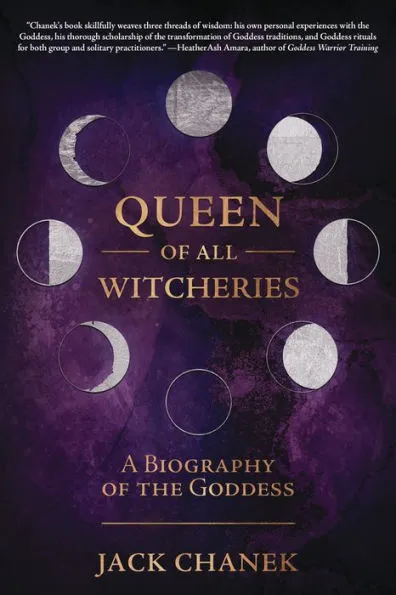There are a number of aphorisms in the world about defining a thing in a circumspect way. Plato kicked things off with his "allegory of the cave" in 'The Republic', describing a person who only knew the shadows that objects cast upon his wall rather than the things themselves. I don't even know who first said that the easiest method of sculpting an object - let's say an elephant for now - is to start with a block of marble and then chip away everything that isn't the elephant. You've probably sparked your own favorite version of this while I've been writing this. Another example, newly given in 2023, is Jack Chanek's lively effort to discern the nature of "The Goddess" by piecing together the various ways she is discussed throughout literature and history. The result of his work is Queen of All Witcheries: a Biography of the Goddess, a worthy addition to your library queue or personal bookshelf.
Be warned: this is a book that can screw with you. I cannot easily explain to someone who hasn't read Queen of All Witcheries how meticulously I had to copyedit that first paragraph! At times Chanek distinguishes between "the Goddess" and "The Goddess" (the all-encompassing Goddess as a pagan concept vs. a single, specified Goddess) and I had to check myself. This meant that even getting the title correct had me digging a bit, since the cover uses one of those "all capitals/no capitals" fonts that didn't make it easy to tell which "the" it was employing. This may feel like a weird digression, but I'm leaving it in precisely because I want to describe how the book raised very specific questions for me that keep me from taking "the Goddess" for granted, be she one particular form or the amalgam of female archetypes. From the very first chapter, when he writes "[t]he story of the Goddess begins long, long ago…in the mid-nineteenth century", I found myself on my back foot. "Did I know this?" I would think on numerous occasions. "I think maybe? But only kind of?" Obviously we're all different in what we do or don't know, but I feel confident in saying there will be some portion of this book to which 95% of you will give a thoughtful "hrm".
So ok, what is the book exactly? Chanek places milestone markers on the calendar at nine different years, starting at 1861 and ending in 1971. At these milestones he examines what shifts in thinking have occurred in Goddess concepts. Some of these eras are well-tread ground - Gerald Gardiner, Doreen Valiente - but others are forgotten monuments, still imposing even if largely forgotten. Chapter 7, for example, checks in on 1948 and goes over Robert Graves's The White Goddess in some depth, both the books itself as well as its inspirations and future works that it inspired. I would never claim to be a deep scholar but I've been around the block a little bit and I feel comfortable saying that a) this sort of material is absent from most "101" fare out there, and b) now that I've seen it, I really think it shouldn't be so esoteric. From this and other sections I came away feeling like I knew more about my own spiritual practices than when I started the book. I'm not sure I can ask much more of a book than that. With any luck, you'll have similar results; I highly recommend that you give it a go.
~review by Wanderer (he/him)
Author: Jack Chanek
Llewellyn Worldwide, 2023
p. $17.99, pp. 240

